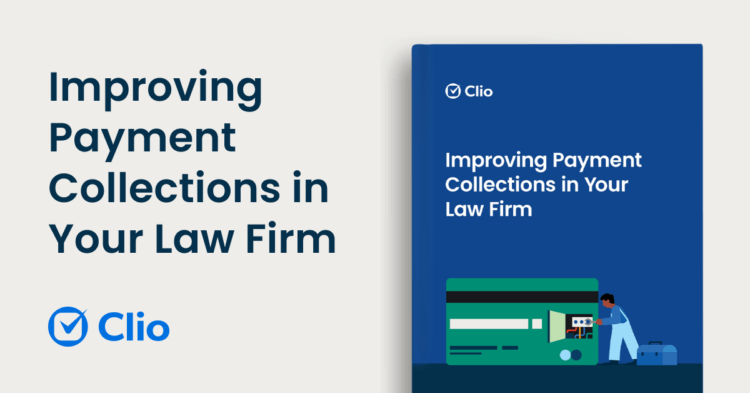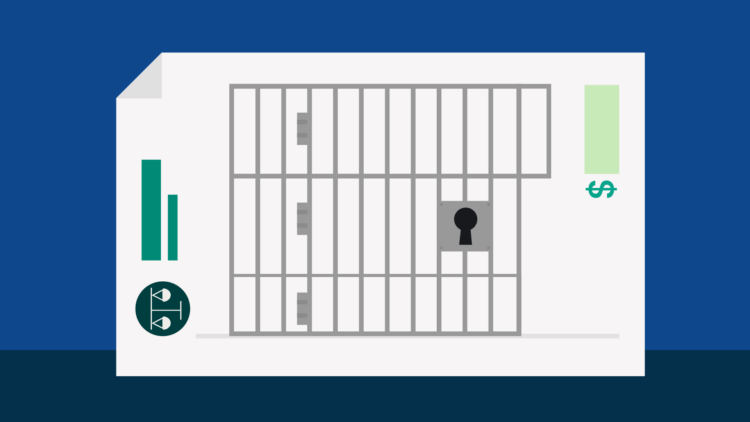Features of Clio's legal time and billing software
Generate individual or split bills. Spend less time on time and expense tracking, review bills faster and share client invoices easily.
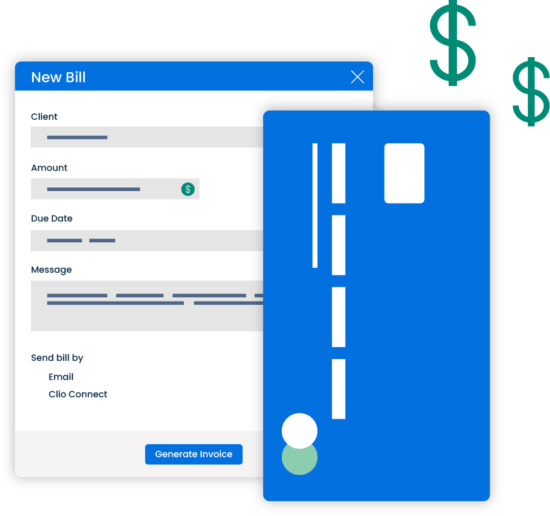
-
Bill securely from anywhere, any time
Create and approve bills on the go, automatically apply interest to late payments, and send bills electronically via Clio for Clients, our secure client portal. Getting bills out fast means getting paid quicker.
Learn More -
Reduce time spent billing
Set up automated payment plans. Make collecting outstanding balances and replenishing trust accounts easy with recurring credit card payments—reducing collection time and increasing cash flow.
-
Get paid faster
Offer flexible payment options with our card processing functionality, Clio Payments, in Clio Manage. Collect payments online through secure click-to-pay links, QR codes, Pay Now buttons on your bills, payment plans, through saved payment information stored from intake, or over the phone. Alternatively, accept payments in person using tap to pay on Clio's mobile app. Sync transactions to Clio and third party accounting systems.
AI handles draft invoices, approval routing, and reminders—so cash flow isn’t delayed.
Learn More About Manage AI -
Accept payment for multiple bills at the same time
Allow clients to pay their balance for all legal bills in one transaction via credit card online. Clio will automatically apply funds to all outstanding invoices.
Reviews of Clio's law firm billing software
Here’s what other law firms have to say about Clio’s billing software.
Customizable legal billing solutions
Personalize Clio’s legal time and billing software to the needs of your law firm and clients.
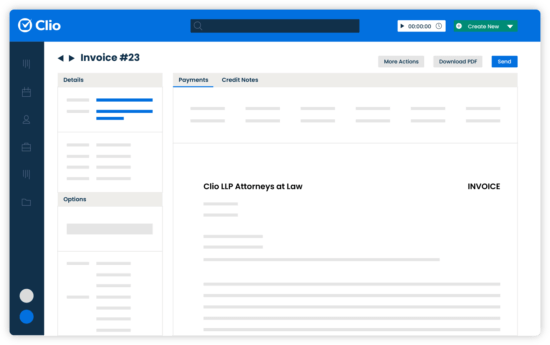
-
Create branded law firm invoices
Create professional, easy-to-read legal invoices with your law firm’s logo. Offer greater transparency by including aggregated or expanded activity lists and detailed statements of accounts.
See it in Action -
Create customized billing plans
Bill clients based on hourly rates or with alternative billing arrangements such as flat fee or contingency. Make collecting fees and replenishing trust accounts easy with recurring credit card payments.
-
Tailor payment profiles to improve collections
Create custom payment profiles in Clio that include grace periods, discounts for prompt payment, and custom interest rates. Assign payment profiles to specific contacts.
Learn More -
Discount and write off bills
Apply percentage or fixed amount discounts to an entire bill, apply credit notes, or convert time entries to no-charge. Quickly write off full or partial bill amounts when needed.
-
Bill clients in their preferred currency
Manage cross-border billing with confidence. Record time and expenses in your firm’s default currency, then convert to your client’s billing currency using mid-market or custom rates for clear, accurate invoices.
AI legal billing software for law firms
-

Bill without the bottlenecks
Think of it as a billing engine that runs itself. Manage AI creates draft invoices and speeds up approvals. The result is fewer errors, faster cash flow, and less manual back-and-forth.
Discover how legal AI powers better billing
Learn more about Manage AI
Get clear law firm billing reports
Clio's law firm time and billing software delivers comprehensive legal billing reports, including reports on law firm finances, insights into accounts receivables, and more.
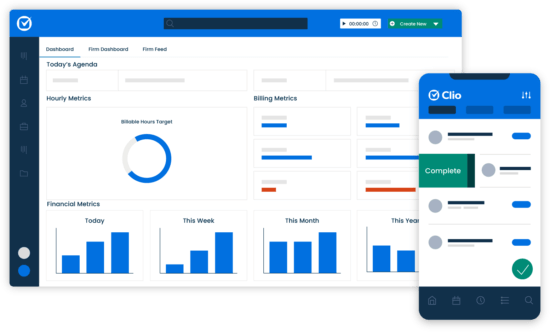
-
View, organize, and share bills with clients
See the status of all your unpaid bills in one tab, and in a single click, prompt clients to pay their invoices.
-
Report on detailed account information
Share a client’s legal billing history and outstanding balances with them using Clio’s Statement of Accounts. Filter reports by client, attorney, date, and account type—whether operating or trust accounts.
-
Generate reports on firm-wide billings
Generate clear legal billing reports to make managing firm finances simple and effective. Report on aging receivables, matter balances, client billing histories, and more.
See it in Action
Law practice billing software resources
Explore more features
-
Case Management
Stay organized, and access the information you need—from anywhere, at any time.
-
Document Management
Edit, store, and organize your legal documents securely, from anywhere.
-
Artificial Intelligence
Work smarter with AI: Turn routine work into completed actions—built right into Clio.
-
Client Management
Easily organize contact details, documents, and communication logs from intake to invoice.
-
Calendaring
Meet every deadline, with legal-specific features like automatic court date scheduling.
-
Task Management
Manage firm productivity by assigning and tracking task completion.
-
Online Payments
Make it easy to pay and get paid with online payments.
-
Time & Expense Tracking
Seamlessly track time and expenses to make billing simple and accurate.
-
Law Firm Reporting
Unlock deeper insights with Custom Reports in Clio Manage. Filter, group, preview, and schedule reports that align with how your law firm works—faster.
-
Client Portal
Enable clients to securely communicate and collaborate with their lawyer from desktop or mobile.
-
Law Firm Communications
Manage client and firm communication all on one platform.
-
Personal Injury
Close cases faster by organizing medical liens, damages, and settlements alongside your case files.
-
Trust Account Management
Simplify legal trust account management with Clio and stay compliant with state bar regulations.

Book a Live Demo
Book a live demo to see how Clio can help your law firm maximize efficiency and increase revenue
Try Clio for Free
Try Clio’s legal software free for 7 days with no obligation. Easy setup. No credit card required. Cancel anytime
Legal billing software FAQs
What is legal billing software?
Legal time and billing software is a specialized program that helps lawyers keep track of their work and expenses and bill clients for that work on a case. It automates time and expense tracking, invoicing, trust accounting, and payment processing for legal professionals.
It streamlines every stage of the billing workflow—time entry, invoice creation, bill review, collections, and payments—so firms improve accuracy, save time, and get paid faster.
Schedule a demo today and see how it works.
What are the benefits of legal time and billing software?
The main advantage of legal time and billing software is that it allows firms to reduce time spent on invoicing, billing and collections. The best online legal billing solution is customizable, with branded invoices and flexible billing plans available to help you get paid faster. Create reports to get a clear picture of outstanding balances/accounts receivables that can be filtered by matter or person.
What is the best legal billing software?
Clio Manage is widely recognized as the best legal billing software, with a rating of 4.5/5 or higher on G2 Crowd, SoftwareAdvice.com, Capterra, and Lawyerist.
Clio Manage is also trusted by over 150,000 legal professionals, and approved by over 100+ bar associations and law societies worldwide.
What is the best accounting software for a small law firm?
Every firm has their own particular needs when it comes to legal accounting, which is why Clio supports several best-in-class options. To keep all firm financials centralized in one system of record, Clio Accounting works seamlessly with data in Clio Manage to keep your firm accurate, informed, and compliant.
Built for legal professionals, not just accountants, Clio Accounting is a more intuitive alternative for US-based law firms. Alternatively, Clio also supports integrations with Quickbooks Online and Xero, which integrate with Clio Manage to provide a streamlined accounting alternative. See how
How do lawyers bill their clients?
If they bill by the hour, lawyers may track their time in six-minute increments and then add this time to an invoice where they note which activities each time log was spent on.
Lawyers may also track their time but use an alternative billing arrangement such as retainers, evergreen retainers, sliding-scale fees, flat fees, contingency fees, or subscription services. See how it works.
How does generating bills work?
Clio allows you to generate bills from the main dashboard of a matter. Clicking the “Quick Bill” button will instantly generate an invoice with all billable time entries. You can also generate bills in bulk.
Read this Help Center article, and watch a brief, four-minute video on how it’s done.
Can I apply trust funds to bills before sharing them?
Yes. Clio’s attorney billing software allows you to approve and apply trust funds to your bills. This applies available trust funds to your invoice and allows the client to pay their balance. If you are out of trust funds, you can always send a trust request. Schedule a demo and see how it works
How do I use attorney billing software to send invoices to clients?
The easiest way to share invoices with clients is over email. Once a bill is approved, click “Share”, and your client will receive an email that allows them to pay their invoice with a credit card. See how
How much does time and billing software for lawyers cost?
Clio’s legal billing solution offers flexible pricing based on the needs of your law firm. Pricing plans start at just $49/month, giving firms of all sizes access to Clio’s powerful billing, invoicing, and trust accounting features.
Can I customize the look of my invoices?
Yes. Clio’s billing software lets you customize headers and themes, and add your law firm’s branded logo to your invoices. See it in Action.
Can I see which clients haven't paid their bills?
Yes. Clio includes a straightforward dashboard of outstanding balances that shows who’s paid their bills, who hasn’t, and when a payment is due. Find out more
Does Clio's legal billing management software integrate with Quickbooks?
Yes. Clio’s billing software for lawyers integrates with Quickbooks. Read this Help Center article to find out how to sync Quickbooks to your Clio account.
What features does legal office billing software have?
The best legal office billing software has a range of features to help your law firm bill efficiently. Below is a set of standard options you should look for first (Clio Manage includes all of these):
Varied billing arrangements: Your attorney time and billing software should let you bill by the hour, or charge flat fees or contingency fees
Custom hourly rates and fees: This lets you charge different set hourly rates for different lawyers in your firm, and different flat fees for certain activities.
Timekeepers: You should be able to track time as you work using stopwatch timers in your law firm time and billing software, or have the option to add time entries after the fact.
Expense tracking: Printing costs, mailing costs, and filing fees also need to be billed to clients. Billing software for attorneys helps you keep track of it all.
Accounting integrations: Your law office billing software should integrate directly with your law firm’s accounting software for easy reconciliation of accounts.
Activity codes: These are standard codes assigned to different activities within your firm such as research, document drafting, or contract review.
LEDES billing codes: For firms that need it, your software should allow you to easily format bills according to LEDES (Legal Electronic Data Exchange Standard). You should also be able to use UTBMS codes (Uniform Task-Based Management System Codes) to give further detail on a LEDES bill.
Invoicing: Bills should be automatically generated based on unbilled time and expenses logged to a case.
Customizable bill themes or invoice templates: Your law firm time and billing software should allow you to create clear, professional bills featuring your firm’s logo and any standard copy needed.
Payment reminders: You should have the option to remind payments if an invoice is past due.
Payment plans: Your law billing software should include the option to put clients on automated payment plans.
Credit card processing: Today’s clients no longer want to pay via check. Your legal billing system should include a credit card processor that allows clients to pay their bills easily via credit card online.
Outstanding client balances: You should easily be able to see the balance of client accounts and whether clients have paid or not.
Trust account management: Your law billing software should help you keep an accurate record of all trust accounts and transactions. You should also be able to keep track of your IOLTA (Interest On Lawyer Trust Account).
Financial reporting: You should be able to see accounts receivables, outstanding balances, and more in easy to read reports, organized by client, matter, or attorney.
How do I choose the best billing software for my law firm?
The best legal time and billing software has a range of features to help your law firm bill efficiently. Below is a set of standard options you should look for first (Clio Manage includes all of these):
Varied billing arrangements: Your billing software for attorneys should let you bill by the hour, or charge flat fees or contingency fees
Custom hourly rates and fees: This lets you charge different set hourly rates for different lawyers in your firm, and different flat fees for certain activities.
Timekeepers: You should be able to track time as you work using stopwatch timers in your attorney time and billing software or have the option to add time entries after the fact.
Expense tracking: Printing costs, mailing costs, and filing fees also need to be billed to clients. Law firm time and billing software helps you keep track of it all.
Accounting integrations: Your legal billing solution should integrate directly with your law firm’s accounting software for easy reconciliation of accounts.
Activity codes: These are standard codes assigned to different activities within your firm, such as research, document drafting, or contract review.
LEDES billing codes: For firms that need it, your legal billing system should allow you to easily format bills according to LEDES (Legal Electronic Data Exchange Standard). You should also be able to use UTBMS codes (Uniform Task-Based Management System Codes) to give further detail on a LEDES bill.
Invoicing: Bills should be automatically generated based on unbilled time and expenses logged to a case.
Customizable bill themes or invoice templates: Your law office billing software should allow you to create clear, professional bills featuring your firm’s logo and any standard copy needed.
Payment reminders: You should have the option to remind payments if an invoice is past due.
Payment plans: Your attorney billing software should include the option to put clients on automated payment plans.
Credit card processing: Today’s clients no longer want to pay via check. Your legal timekeeping and billing software should include a credit card processor that allows clients to pay their bills easily via credit card online.
Outstanding client balances: You should easily be able to see the balance of client accounts and whether clients have paid or not.
Trust account management: Your legal billing system should help you keep an accurate record of all trust accounts and transactions. You should also be able to keep track of your IOLTA (Interest On Lawyer Trust Account).
Financial reporting: You should be able to see accounts receivables, outstanding balances, and more in easy-to-read reports organized by client, matter, or attorney.
Compare Clio's law practice billing software
We’ve put together side-by-side comparisons (including prices and reviews) to help you compare Clio's leading legal software against other lawyer billing software solutions.
-
Abacus
Abacus (AbacusLaw) offers a range of solutions from case management to a private cloud server and desktop software.
-
Caret Legal (formerly ZolaSuite)
Caret Legal is practice management software that offers integrated legal billing and accounting, email syncing, and limited integrations.
-
CosmoLex
Cosmolex offers features including an accounting suite that will help your firm handle payments, trust accounting, and more.
-
Filevine
Filevine is a cloud-based software designed for a few specific practice areas. Multiple add-ons including eSignature, document management, document assembly, and business insights are available.
-
LEAP
LEAP offers a primarily PC-based experience but offers a companion cloud-based app. It includes legal billing, case management, and a limited number of integrations.
-
Mycase
MyCase offers straight-forward legal practice management software with a number of built-in features and select integrations.



